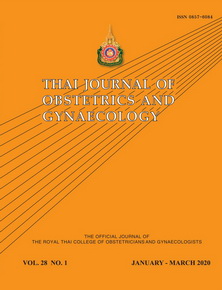Prevalence of False Positive 50-g Glucose Challenge Test in Risk-based Screening Before 20 Weeks of Gestation and Relationship with Adverse Pregnancy Outcomes
Main Article Content
Abstract
Objectives: To determine the prevalence of false positive results of 50-g glucose challenge test (GCT) in risk-based screening before 20 weeks of gestation and relationship with pregnancy outcomes.
Materials and Methods: A total of 500 singleton pregnancy who were at risk for gestational diabetes mellitus (GDM) and received 50-g GCT for GDM screening before 20 weeks of gestation were included. Women with abnormal 50-g GCT received 100-g OGTT for GDM diagnosis. Prevalence of false positive results of 50-g GCT and GDM were estimated. Various baseline characteristics and pregnancy outcomes were compared between groups.
Results: Mean age was 33.4 ± 4.9 years, mean Body mass index (BMI) was 22.9 + 4.4 kg/m2, and 45.6% were nulliparous. Common GDM risks were age ≥ 30 years (81.6%), family history of diabetes mellitus (DM) (30.4%), and overweight/obesity (24.6%). Mean gestational age at GDM screening was 9.8 + 3.9 weeks. Normal 50-g GCT was found in 243 women (48.6%), 187 women (37.4%) had false positive GCT, and 70 women (14%) had GDM. Women with GDM had significantly higher age, BMI, and more likely to be overweight or obese than others (p < 0.05). Gestational weight gain was comparable between normal and false positive GCT but it was significantly greater than GDM (p < 0.001). A significant trend of increasing in the rate of large for gestational age (LGA) was observed in normal GCT, false positive GCT, and GDM group (14.4%, 21.9%, and 25.7%, respectively, p = 0.013). Logistic regression analysis showed that false-positive GCT and GDM independently increased the risk of LGA (adjusted odds ratio 1.76, 95% confidence interval 1.05-2.94, and 2.15, 95% confidence interval 1.1-4.23).
Conclusion: Prevalence of false positive GCT was 37.4%. False-positive GCT and GDM independently increased risk of LGA.
Article Details
References
2. American Diabetes Association. Standards of medical care in diabetes. Diabetes Care 2017;40(Sup. 1):S11-24.
3. Grotegut CA, Tatineni H, Dandolu V, Whiteman VE, Katari S, Geifman-Holtzman O. Obstetric outcomes with a false-positive one-hour glucose challenge test by the Carpenter-Coustan criteria. J Matern Fetal Neonatal Med 2008;21:315-20.
4. Gumus, II, Turhan NO. Are patients with positive screening but negative diagnostic test for gestational diabetes under risk for adverse pregnancy outcome? J Obstet Gynaecol Res 2008;34:359-63.
5. Stamilio DM, Olsen T, Ratcliffe S, Sehdev HM, Macones GA. False-positive 1-hour glucose challenge test and adverse perinatal outcomes. Obstet Gynecol 2004;103: 148-56.
6. Yee LM, Cheng YW, Liddell J, Block-Kurbisch I, Caughey AB. 50-Gram glucose challenge test: is it indicative of outcomes in women without gestational diabetes mellitus? J Matern Fetal Neonatal Med 2011;24:1102-6.
7. Yogev Y, Langer O, Xenakis EM, Rosenn B. The association between glucose challenge test, obesity and pregnancy outcome in 6390 non-diabetic women. J Matern Fetal Neonatal Med 2005;17:29-34.
8. Dudhbhai M, Lim L, Bombard A, Juliard K, Meenakshi B, Trachelenberg Y, et al. Characteristics of patients with abnormal glucose challenge test and normal oral glucose tolerance test results: comparison with normal and gestational diabetic patients. Am J Obstet Gynecol 2006;194:e42-5.
9. Gezer A, Esen F, Mutlu H, Ozturk E, Ocak V. Prognosis of patients with positive screening but negative diagnostic test for gestational diabetes. Arch Gynecol Obstet 2002;266:201-4.
10. Tan PC, Ling LP, Omar SZ. The 50-g glucose challenge test and pregnancy outcome in a multiethnic Asian population at high risk for gestational diabetes. Int J Gynaecol Obstet 2009;105:50-5.
11. Sunsaneevithayakul P, Boriboohirunsarn D, Sutanthavibul A, Ruangvutilert P, Kanokpongsakdi S, Singkiratana D, et al. Risk factor-based selective screening program for gestational diabetes mellitus in Siriraj Hospital: result from clinical practice guideline. J Med Assoc Thai 2003; 86:708-14.
12. Rasmussen KM, Yaktine AL, editors. Weight gain during pregnancy: Reexamining the guidelines. Washington, DC: The National Academies Press 2009.
13. Ezell JM, Peters RM, Shill JE, Cassidy-Bushrow AE. Association between prenatal one-hour glucose challenge test values and delivery mode in nondiabetic, pregnant black women. J Pregnancy 2015;2015:835613.
14. Boriboohirunsarn D. Prevalence and risk factors for inappropriate birth weight for gestational age. Asian Biomed 2015;9:637-42.
15. Farrar D, Duley L, Dowswell T, Lawlor DA. Different strategies for diagnosing gestational diabetes to improve maternal and infant health. Cochrane Database Syst Rev 2017;8:CD007122.
16. Brown FM, Wyckoff J. Application of one-step IADPSG versus two-step diagnostic criteria for gestational diabetes in the real world: Impact on health services, clinical care, and outcomes. Curr Diab Rep 2017;17:85.
17. Tian C, Hu C, He X, Zhu M, Qin F, Liu Y, et al. Excessive weight gain during pregnancy and risk of macrosomia: a meta-analysis. Arch Gynecol Obstet 2016;293:29-35.
18. Carreno CA, Clifton RG, Hauth JC, Myatt L, Roberts JM, Spong CY, et al. Excessive early gestational weight gain and risk of gestational diabetes mellitus in nulliparous women. Obstet Gynecol 2012;119:1227-33.
19. Sridhar SB, Xu F, Hedderson MM. Trimester-specific gestational weight gain and infant size for gestational age. PLoS One 2016;11:e0159500.
20. Bevier WC, Fischer R, Jovanovic L. Treatment of women with an abnormal glucose challenge test (but a normal oral glucose tolerance test) decreases the prevalence of macrosomia. Am J Perinatol 1999;16:269-75.


